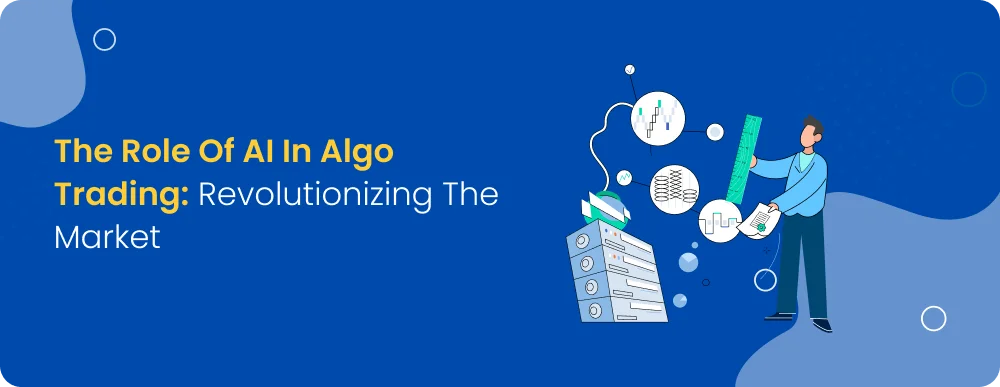The Role Of AI In Algo Trading: Revolutionizing The Market
Noor Kaur
21 Feb 2025Tags:
Featured
AI is changing algo trading by making trade execution faster, more accurate, and adaptive to market conditions. With the ability to analyse vast datasets, detect patterns, and adjust strategies in real time, AI stock market trading is improving decision-making while reducing manual effort. Traders now rely on AI algorithms for stock trading to optimise risk management, enhance efficiency, and gain a competitive edge.
Understanding Algorithmic Trading
Algorithmic trading, or AI automated trading, involves using computer software to execute trades based on predefined rules derived from historical data analysis, technical indicators, and market trends. By eliminating manual intervention, AI algorithm trading helps execute trades at high speed and efficiency. Traders use AI algorithms for stock trading to identify profitable opportunities and minimise human errors.
Also Read: SEBI’s New Algo Trading Rules: How They Impact Retail Traders
How AI Enhances Trading Strategies
AI improves trading strategies by analysing large amounts of real-time market data. Traditional strategies rely on historical patterns, but AI stock market trading adapts dynamically to market fluctuations.
For example, machine learning models assess risk factors, detect market anomalies, and optimise trade execution. This allows traders to fine-tune their strategies and make informed decisions without delays.
Stock trading AI is particularly beneficial in identifying trends before they become apparent to manual traders.
Also Read: Algo Trading vs. Manual Trading: Pros and Cons
AI and High-Frequency Trading (HFT)
High-frequency trading is an algorithmic type in which many orders are executed within fractions of a second. AI enhances AI automated trading in HFT by improving trade execution speed and reducing latency (the time delay in processing orders).
AI-powered models analyse market microstructures and predict price movements with high accuracy. AI for trading stocks allows firms to gain a competitive advantage by executing trades faster than human traders ever could.
AI in Risk Management
AI helps traders assess risk by analysing market volatility, historical performance, and asset correlations. It identifies potential losses before they escalate and adjusts positions accordingly.
AI stock market trading integrates news and social media sentiment analysis to detect market sentiment shifts. This helps traders react quickly to potential risks and safeguard their investments.
The Impact of AI on Market Liquidity
AI-powered trading systems help stabilise markets by providing continuous buy and sell orders, narrowing bid-ask spreads (the difference between buying and selling rates), and improving trade execution. However, excessive reliance on AI in trading can sometimes lead to unintended market disruptions.
Here are some ways how AI affects market liquidity:
- Faster Trade Execution: AI speeds up order processing, reducing delays and improving liquidity.
- Better Price Discovery: AI algorithms analyse large datasets in real-time, helping traders determine fair asset prices.
- Lower Transaction Costs: AI-driven market makers reduce bid-ask spreads, making trading more cost-effective.
- Market Stability Risks: Sudden AI-driven trades can sometimes trigger flash crashes (sharp, rapid price declines).
- Algorithmic Trading Risk: Over-reliance on AI models can lead to unpredictable market behaviours, requiring stricter AI algo trading oversight.
The Future of AI in Algo Trading
AI is continuously evolving, with advancements such as:
- Advanced Predictive Analytics: AI will refine stock trading AI by analysing news sentiment, social media trends, and macroeconomic factors.
- Increased Automation: AI will handle larger portions of trading strategies, reducing manual intervention while improving efficiency.
- Stronger Risk Management: AI-driven algorithmic trading risk management systems will help detect anomalies and prevent losses.
- Decentralised AI Models: AI systems may shift towards decentralised models, reducing dependence on a single data source.
- Regulatory Changes: As AI adoption grows, authorities will introduce stricter regulations to effectively manage AI for trading stocks.
Challenges and Limitations of AI in Algo Trading
Despite its benefits, AI-driven stock trading with AI has limitations, including:
- Data Quality Issues: Poor or biased data can lead to flawed trading decisions.
- Overfitting Risk: AI models may perform well on past data but fail in live market conditions.
- Market Manipulation Concerns: AI-driven trades sometimes amplify price fluctuations, leading to regulatory scrutiny.
- High-Frequency Trading Risks: AI-driven high-frequency trading risk management requires careful oversight to prevent market disruptions.
Lack of Human Judgment: AI lacks human intuition, sometimes necessary during unexpected market events.
Also Read: Navigating the Risks and Challenges of Algorithmic Trading
Conclusion
The integration of AI in algo trading, increasingly supported by a Demat App, is reshaping financial markets by increasing automation, reducing human error, and improving trade outcomes. As stock trading with AI evolves, traders who adapt to these advancements will benefit from more precise and efficient strategies. While AI offers significant advantages, balancing automation with human oversight remains crucial for long-term success.
FAQs
How does AI improve the efficiency of algorithmic trading?
AI speeds up decision-making by analysing large datasets in real time, identifying patterns, and executing trades instantly. This reduces delays and improves accuracy in AI-automated trading.
What are the main benefits of integrating AI into trading strategies?
AI enhances trading by improving pattern recognition, reducing emotional bias, and optimising trade execution. AI algorithms for stock trading also adapt to market changes faster than manual strategies.
Can AI predict market trends more accurately than human traders?
AI can analyse huge amounts of data and detect trends that human traders might miss. However, AI for trading stocks is not infallible, as unpredictable events can influence markets.
How does AI enhance risk management in algorithmic trading?
AI improves algo trading by detecting potential risks, adjusting strategies in real-time, setting stop-loss levels based on market conditions, and reducing unexpected losses.
What is the role of predictive analytics in AI-driven trading?
Predictive analytics in stock trading helps forecast price movements by analysing historical data, market sentiment, and economic indicators, improving decision-making.
How does AI impact market liquidity and volatility?
Stock market AI increases liquidity by executing trades at high speeds, but it can also contribute to volatility during market fluctuations when automated strategies react simultaneously.
Noor Kaur
21 Feb 2025Related blogs
Sign up to our newsletter !
Share this article on
Recent articles
Tags:
Open a Demat Account in just 15 minutes !

Click on open
account below

Fill out some
basic details

Upload your
documents

Start trading in
24 Hours *
Commonly asked questions
Is Master Capital Services Limited SEBI registered?
Do you have a mobile app for Trading and Finance Management?
What services does mastertrust provide?
What is the minimum investment required to start trading with your company?
Is my personal and financial information secure with your company?
What is your customer support availability?





